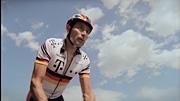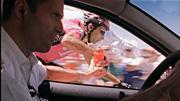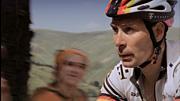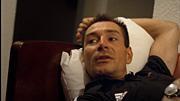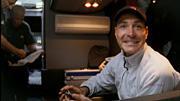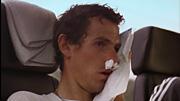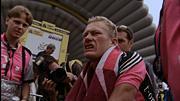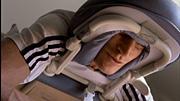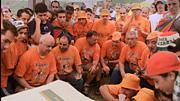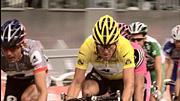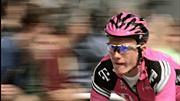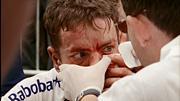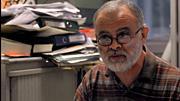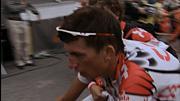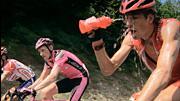Film review: Hell on Wheels, May 20, 2005 (updated June 3, 2005)
It may be 'Hell on Wheels', but it's heaven on-screen
Quality films about professional road cycling are very rare and the German film, Höllentour (Hell on Wheels) is a 'must see', reports Gerard Knapp.
|
|
|
|
|
|
|
|
|
|
|
|
|
|
|
|
|
|
|
|
|
|
|
|
|
|
|
|
|
|
|
Freed from the constraints of strict television reportage, German film-maker and Academy Award-winner Pepe Danquart has produced a beautiful film about road racing, capturing the colour, movement, atmosphere and drama in a way that places it among those special sports documentary films that transcend the boundaries of interest only to the committed fan.
In other words, this is no ordinary regular race video. Danquart and his crew base their documentary around the Centenary Tour de France of 2003, following the fortunes of then Deutsche Telekom (now T-Mobile) professionals, Erik Zabel and Rolf Aldag.
But this is not just about the two German riders. The film follows the race - with sidebars on Tyler Hamilton's amazing performance - but it has no narration (voice-over), a sure sign of a confident filmmaker. Rather, it's the pictures, the riders and the cameos from a varied cast of characters who tell the stories and provide the insights.
This is not to say the film is only for the die-hards; rather, it is perhaps one of the first cycling films that could help non-cyclists understand the passion and suffering of this simultaneously beautiful and brutal sport.
As French journalist Serge Laget says about the TdF and road racing in general: "the cyclists come to the audience … cycling is the only sport that ennobles the spectators".
The film takes you inside the hotel rooms and team buses of these riders, but most importantly, inside their minds as they tackle the 2003 Tour. Zabel in particular provides an honest appraisal of his own performance and only a rider of his experience and phenomenal palmares could afford such revelations. Indeed, it is his stature that gives his comments and observations such weight.
Put it this way, if you're not already a fan or admirer of the mighty German sprinter, this film will make you one. His courage, honesty and attitude are what make this film special, matched with stunning cinematography and an original music score (yes - they could afford a composer).
Serious production values
The film opens with that all-too-familiar logo - Universal Pictures - that creates an expectation of cinematic production values rarely afforded to cycling films. "Hell on Wheels" doesn't fail to deliver, with the opening credits reminiscent of a '60s screwball comedy; the riders and key players introduced as if they were actors.
And to set the scene further, all that's needed is the voice of Lance Armstrong at his pre-Tour press conference, while the pictures show the frenetic activity of the Tour de France the day before the riders roll-out: "I show up prepared, I show up motivated and I show up because I love it and I respect it and I want to do well. Nothing means more to me than to win this event", says Armstrong.
His powerful statement and conviction sets the tone for the film's capture of the uncompromising suffering that will unfold over the next three weeks.
The next day, the camera catches Paris at dawn as the city prepares for the prologue with a smoky saxophone providing the atmosphere as workers clean the streets and empty the bins. Words are not needed. The camera shows the riders as they wait at the starting gate, nervously squeezing their brakes before they roll on towards three weeks of racing.
Those hoping for straight reporting of Bradley McGee's famous victory in the opening prologue - and David Millar's infamous chain-throw - will be disappointed. Instead, Zabel relays the news of the Australian's victory to his teammates in their bus via SMS messages received on his mobile phone. This is how fellow competitors keep up with the results.
Instead, the factual reporting is provided by monologues delivered by the French journalist Saget, who explains the Tour's status as a sporting event and its cultural context in France. This also allows Danquart to integrate rare archival footage from the race's history, to punctuate the coverage of the race.
The film pays no special attention to the fact it's the 100th anniversary of the Tour; this is discerned by the cavalcade of facts and emotion that spouts from Saget, such as "before, they covered 2500km in six stages!"
To the road we go
The coverage of the road stages is to provide visual impressions of the race, that are more 'real' than normal television coverage. It comes from a multitude of views, whether it's inside the team car with Telekom DS Mario Kummer (a master of the 'turbo-bottle'), or following spectators, spending a day with the legendary commentator Daniel Mangeas, waiting with gendarmes, workers and, of course, the riders.
Jan Ullrich is shown laughing with his former teammates from Telekom as they roll out, spectators patiently wait by the side of the road as the peloton flies past in a colourful blur. The camera is stationary - like the spectators - so the action is placed in its proper context; it's all over in seconds. However, the film also provides answers as to why people do wait for hours, camp out and share experiences.
As many will recall, the first stage of the 2003 TdF (see report) resulted in a dreadful pile-up, and two major casualties were Telekom's Andreas Kloeden (with a broken coccyx) and CSC's Hamilton's now legendary fractured collarbone.
Zabel offers the perspective of a Tour veteran: "the Tour, eh, there's always a crash in the first stage". His voice has the tone of a rider who's been there before, many times. Kloeden, standing in his underwear, emaciated as climbers are, tells the camera "it's like I've had a run-in with a boxer".
The Telekom riders talk openly in their hotel rooms, on the massage table, over meals and in the team bus. The camera becomes the passive observer, taking you right into the heart of a professional team dealing with its first major setback.
The team time trial, perhaps the most singularly beautiful example of cycling's athleticism and synchronicity, is captured by long shots of the teams dissecting sunflower fields, as well as close-ups that show the muscles flexing, the sweat trickling down faces, mouths gaping open for air. You feel their strain and whether it's exceptionally good location sound - or a very good Foley artist in sound post-production - you hear their breathing and the sound of the gears and disc wheels. Later, it's pursuiter's cough all-round as the riders recover in the team bus, slowly unpeeling skin-suits and gulping down water.
The early stages are tough for Zabel and Telekom and the sprinter contemplates the arrival of Italian Alessandro Petacchi, and his seeming invincibility. "Petacchi is so fast. He's so much better than everyone else," Zabel says after a stage where he finished - once again - behind the Ale-Jet, "that it almost makes it bearable. It's worse when you're always second or third and a new guy wins every day. Then you begin to despair," he says.
It is the close relationship between the Zabel and Aldag - "sort of like a marriage, he doesn't snore," Zabel says with a laugh - that gives the film its human dynamic. They're best mates and Zabel readily acknowledges the sacrifices made by Aldag in helping bring back all those breakaways and starting the lead-outs.
But as for hotel room politics, Zabel explains: "he who has the TV remote has the control, he has the power".
Their closeness is never over-stated, but the familiarity is there. Telekom's fortunes change when Aldag secures the polka dot climber's jersey, so his hotel roommate of 11 years, Zabel, answers his mobile phone with his best formal tone: "Office of the best climber in the world, Rolf Aldag."
They reveal the tensions and doubts of every rider who has to face an individual time trial, or a brutal mountain stage. "Look at this shit!" Zabel exclaims from the back of the team bus after reviewing the profile of yet another tough day in the mountains.
The fears of a sprinter - those same courageous souls who head-butt and elbow their way at 70kmh into the finales of the flat stages are the long climbs and efforts against the clock. Relegation and finishing outside the time limit is their pre-occupation.
Zabel is also caught up in an accident in one stage, but he is left to fend for himself and comes in over five minutes behind the peloton. Despite such a setback, the camera is allowed into the massage room as a heavily bandaged Zabel discusses the awful day with Eule, who provides a sympathetic ear and soothing hands.
To see Zabel's introspection as he is wiped down by confidante and legendary soigneur, Eule (Dieter Ruthenberg) after he finishes a tough ITT into a block headwind provides a rare insight into the mind of a champion.
Waiting for action
The camera provides a constantly roving eye over the Tour - such as following a young, attractive German girl and her parents, who are major Ullrich tragics - through to the set-up of the massive television broadcasting infrastructure and of course, the spectacular aerial shots of the Alps.
We wait with French villagers as they set up the TV and lunch table, doing no more than leaving their chairs and walking to the side of the road as the peloton rushes past. We watch a female gendarme remonstrate with a young couple who'd failed to sufficiently restrain their child, we wait on the side of the road with senior couple playing cards on their picnic table, a small transistor radio keeping them informed.
The film manages to capture the real pace of following the event. To be sure, there are long periods of waiting, but the surrounding countryside is generally beautiful; it's a nice day out.
But then there is high drama. The film captures the 2003 Tour's defining moments exceptionally well; we wait with a group of Basque fans clad in orange on that dramatic stage to Luz Ardiden, standing around a small television receiver in the Pyrenees as Iban Mayo, Armstrong, Ullrich and Hamilton make their way to the top.
There is seemingly no way through this crowd, until it parts and Armstrong surges dramatically through the throng, out of the saddle and raging against the forces that threatened to derail his fifth Tour victory (revisit that day).
Then there is Hamilton's spectacular solo effort on stage 16, but it's Zabel who puts it into perspective, as only a Tour rider can (see Cyclingnews report).
As the Tour progresses, Zabel continues his fight against time and competition. He recognizes and respects his fellow sprinters - Baden Cooke, Robbie McEwen, Petacchi - but Erik won't quit.
"You say, 'God, I know you have better things to do, but please give me another year'," Zabel says, looking into the distance. "I've said that for few years now!" He quickly adds, laughing loudly.
Rarely have a rider and team provided such access and Danquart and his crew have not squandered this opportunity. They have produced a wonderful documentary that is essential viewing for passionate cyclists and anyone with an interest in human endeavour.
Cyclingnews verdict: Highly recommended - a big two-arm victory salute.
US availability
Hell on Wheels has been available on DVD in the Asia-Pacific area for a while, through the Cyclingnews shop, among other sources, but US readers can now obtain it on DVD through cycling e-tailer World Cycling Productions or via independent film specialist First Run Features.
MSRP: US$29.95
More info: www.worldcycling.com
or www.firstrunfeatures.com
More stills from Hell on Wheels
For a thumbnail gallery of these images, click here
Images by Aztec International
- Riders burst onto the screen in 'Hell on Wheels'
- Erik Zabel after the individual time trial.
- That hurt
- Erik Zabel - typically exhausted. Film-maker Danquart was allowed access to the riders even when they were shattered.
- Crowd control - a gendarme keeps back the fans
- A cycling priest with a chapel full of jerseys - both deities are worshipped here.
- A gendarme controls Basque fans - enthusiastic supporters feature prominently
- Are we there yet?
- Suffering in the mountains - the phase of the Tour all sprinters fear.
- The pain shows.
- Hot enough for you?
- The post-stage melee
- Basque orange gets everywhere.
- Jimmy Caspar and some very big mountains
- A bottle hand-up can take a surprisingly long time in the mountains.
- An Alessio rider in the mountains
- The mountains provide a spectacular backdrop for much of the film.
- Zabel contemplates the distance to the top
- Fans applaud Zabel - in the mountains, everyone is a hero even if they are just struggling to avoid the time cut.
- Zabel toils toward the finish
- Erik Zabel working hard in the mountains
- Telekom DS Mario Kummer gives orders over the radio
- Mario Kummer drives the team - and the team car
- Alexandre Vinokourov gets a post-race clean-up from a team soigneur.
- Basque fans line the roads of the Pyrenees and are completely unfazed by a passing motorised duck.
- Fans watch the race approach on TV
- Tyler Hamilton - the then-CSC rider's astounding 2003 Tour ride with a fractured collarbone is featured in the film
- Alexandre Vinokourov arrives in Luz Ardiden.
- Alexandre Vinokourov
- Dropping from the clouds
- Riders speed downhill
- He who has the remote has the power - Zabel explains hotel room politics
- The Tour caravan - hundreds of vehicles dedicated to heralding the race and selling stuff.
- Zabel catches up with the papers on a train transfer
- Rolf Aldag catches some zeds on a train transfer.
- Telekom soigneur Dieter "Eule" Ruthenberg
- A transfer - seeing France from the window of a TGV is less hard work than racing across the countryside.
- Rolf Aldag shares a TGV table with Zabel as well as a hotel room.
- The finale on the Champs Elysees
- Lance Armstrong (on right) arrives inParis
- The US Postal team in the special 'US Mail' kit for the last day of the Centenary Tour.
- The race flashes past spectators
- Zabel rides in the pack alongside an ONCE rider.
- Alexandre Vinokourov
- Lance Armstrong on the way to joining the five-winners club
- Teh race blurs past a photographer - big lenses freeze the action for the world's print.
- The Tour de France comes to town
- A hard day's work.
- Erik Zabel on the Champs Elysees at the back of a small bunch that includes team-mate Alexandre Vinokourov, Brad McGee, and Stuart O'Grady
- The Champs Elysees - the traditional scene of the Tour's final-day procession
- Steve Zampieri
- Erik Zabel looks relieved that it's all over for another year
- Rolf Aldag in the opening prologue TT
- Zabel powers over a crest in the prologue time trial.
- Hey, McGee won - Zabel gets the prologue finish news via SMS.
- The peloton passes through a French village.
- Legs. Ultimately, it's all about legs and lungs, hearts and minds.
- Race action.
- Crash damage is an ever-present danger.
- Alexandre Vinokourov in a reflective moment
- Ouch. Andreas Kloeden was a victim of the stage one pile-up.
- Sweat. The vital ingredient.
- Not a view of a bike racer you often see - Rolf Aldag gets a massage.
- Telekom soigneur Dieter "Eule" Ruthenberg is friend, confidante and masseur to the riders.
- French journalist Serge Laget provides the history and emotion of the Tour.
- Rolf Aldag gets a massage


